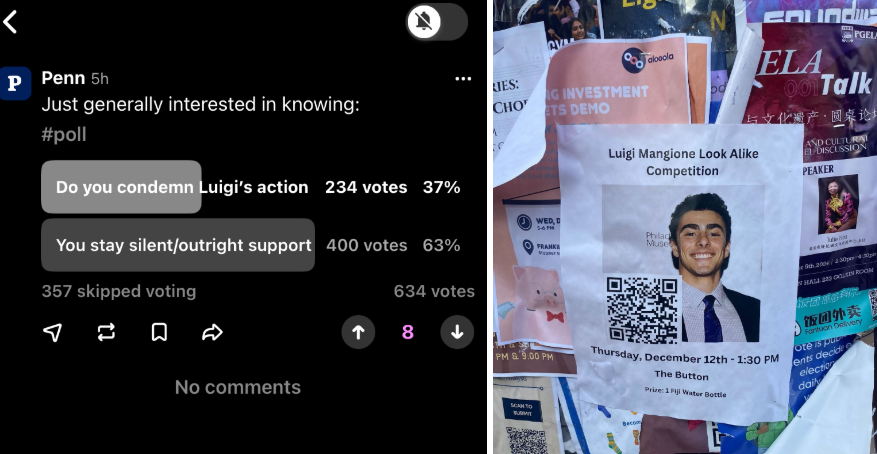
On the Record | Stop falling for a false dichotomy in your relationships
Photo Credit: Lexi Boccuzzi
By Lexi Boccuzzi
Nothing makes you reminisce about long-lost loves or the right person from the wrong time quite like being home for the holidays—and films certainly don’t help.
If your conception of romance was limited to this genre, you’d think that anything but a life-altering relationship was anticlimactic. Take modern classics like Love Actually and The Holiday. In both stories, British-accent-ridden, star-crossed affairs quickly turn to happily ever after, surmounting even transatlantic-sized logistical barriers. Nothing in life is that black-and-white, certainly not the gray and rainy Great Britain.
While the movies may make falling for your best friend’s wife (as is normalized in Love Actually) or uprooting your life to chase someone across the pond (like the protagonists in The Holiday) seem like simple kismet, real life is far more complicated.
Insert the age-old adage: “If you love someone, let them go.” If the movies argue that love conquers all, conventional wisdom—particularly in the modern age—stresses convenience and practicality.
“Block your ex!”
“Long distance can’t work—end it with them.”
“You have to confess your feelings for your friend now, it’s make or break!”
I’m sure you’ve heard it all. I know I have.
But what if there was another option? What if we advised that if you love someone, you should let them grow? Loving someone should not, and does not have to be a false binary between stopping life for them, or letting them go completely.
Despite what Hollywood might say, love involves reason. Affection grows from real benefits that an individual brings to your life. Their value-add—personally, emotionally, or even professionally—doesn’t simply disappear when you break up or decide that pursuing a relationship might be too complicated at the moment.
More than half of Americans are friends with at least some of their exes, despite 40% of respondents saying they were uncomfortable by that prospect in the abstract. These same people, however, reported a much lower preference for “best friendship” with people they’ve already dated. Left to their own devices, people frequently “live and let grow” with their exes. Distance comes naturally but complete shutouts are less common.
This tactic also helps to fight overly-romanticized reflections on our past or future loves. Forgoing even semi-regular contact with exes can make it easy to reminisce on the best parts of relationships without considering the flaws that caused things to end in the first place. Similarly, it can allow our worst relationships to exert outsized control on who we become.
As I shared a beer with a former person-of-interest in my hometown this Christmas break, I was acutely reminded of his mortality. Distance can make the heart grow fonder, making proximity crucial to removing someone from the pedestal your memory has awarded them.
The same is true in instances of long awaited feelings. Unlike in a Nancy Meyers movie, real romantic feelings are rarely all or nothing. A 2021 study found that roughly two-thirds of respondents’ current or most recent relationships started as friends. Those friendships lasted almost two years before developing into something more. As anyone who has ever felt sparks with a friend can tell you—the waiting period was likely a product of logistical complication or slow burn, classic obstacles of the friends-to-lovers phenomenon.
Nonetheless, putting either of your lives on hold while you sort out your emotions is not an act of love. While you operate quasi-platonically, loving someone may require slight distance. Backpacking in Asia, or that dream job in London, may be just the thing you both need to determine how close you should be.
Moderated distance, with potential partners and even current ones, can also bring clarity and intentionality to your interactions. What better way to realize if you are compatible than to see how willing you are to remain in one another’s life? This is key to the defense of long distance relationships aimed at marriage and is likely why 60% are successful in the long term.
None of this is to say that distance or moderated distance is easy. There are exes, and friends you are irrevocably in love with, with whom you should set boundaries. There also comes a time when life necessitates deciding with someone, where to live or what jobs to take. But that time doesn’t have to be in your 20s.
With my friends—prospective and former love interests included—spread across the Eastern seaboard and beyond, I’ve been forced to value distance. Postgraduate life has been filled with difficult moments of longing and realizations that romantic doors I thought were open might be closed in the interim. However, it’s also been colored by calls debriefing on the latest adventures and watching people I love mature in ways life with me could have deprived them of.
In the often blurry lines of young adulthood, with its close professional and personal circles, loving someone by letting them grow is an antidote to both heartache and animosity. More importantly though, it also keeps us available to the possibility and joy that the twists and turns of a well-lived early life can bring.
You never know, their growth may end up with you two criticizing the realism of festive Netflix movies you watched together this time next year.
Lexi Boccuzzi is a Staff Writer at the Washington Free Beacon and a Penn 2024 graduate of the College. Lexi was the founding editor-in-chief of The Pennsylvania Post. Her email is abb628@sas.upenn.edu.




